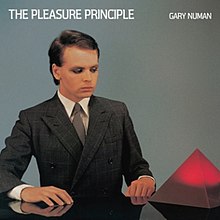The Pleasure Principle (Gary Numan album)
| The Pleasure Principle | ||||
|---|---|---|---|---|
 |
||||
| Studio album by Gary Numan | ||||
| Released | 7 September 1979 (UK) 25 September 1979 (US) |
|||
| Recorded | Mid-1979 | |||
| Studio | Marcus Music AB, London | |||
| Genre | New wave, synthpop | |||
| Length | 41:07 | |||
| Label | Beggars Banquet (UK), Atco (US) | |||
| Producer | Gary Numan | |||
| Gary Numan chronology | ||||
|
||||
| Singles from The Pleasure Principle | ||||
| Professional ratings | |
|---|---|
| Review scores | |
| Source | Rating |
| AllMusic | |
| Mojo | |
| Q | |
| Record Collector | |
| Smash Hits | 7/10 |
| Spin | 8/10 |
| Uncut | |
| The Village Voice | B |
The Pleasure Principle is the third studio album (and debut album under his own name) by British musician Gary Numan. Released about six months after Replicas (which was still under the name Tubeway Army) in 1979, The Pleasure Principle also went to number 1 in the United Kingdom.
Numan completely abandoned guitars on the album. This change, coupled with frequent use of synthetic percussion, produced the most purely electronic and robotic sound of his career. In addition to the Minimoog synthesizer employed on his previous album, Numan made liberal use of the Polymoog keyboard, particularly its distinctive "Vox Humana" preset. Other production tricks included copious amounts of flanging, phasing and reverb, plus the unusual move of including solo viola and violin parts in the arrangements. Numan was also influenced by Kraftwerk; the track "Cars" had the same musical "glides" as "Autobahn" and both songs used the same synthesizers.
Notable tracks included "Airlane", the lead-off instrumental; "Metal", sung from the perspective of an android longing to be human (covered by Nine Inch Nails on Things Falling Apart and Afrika Bambaataa on Dark Matter Moving at the Speed of Light, and used as backing for Planet Funk's "Who Said"); "Films", acknowledged by Bambaataa as an important influence on the U.S. hip hop scene; "M.E.", told from the perspective of the last machine on Earth (later used as backing for Basement Jaxx’s "Where’s Your Head At?"); the electronic ballad "Complex", a UK number 6 single; and "Cars", a worldwide synthpop hit. "Cars" reached number 9 in the U.S. and number 1 in Canada, helping make The Pleasure Principle Numan's strongest stateside showing, but lack of a strong commercial follow-up resulted in him being tagged as a one-hit wonder there.
...
Wikipedia
